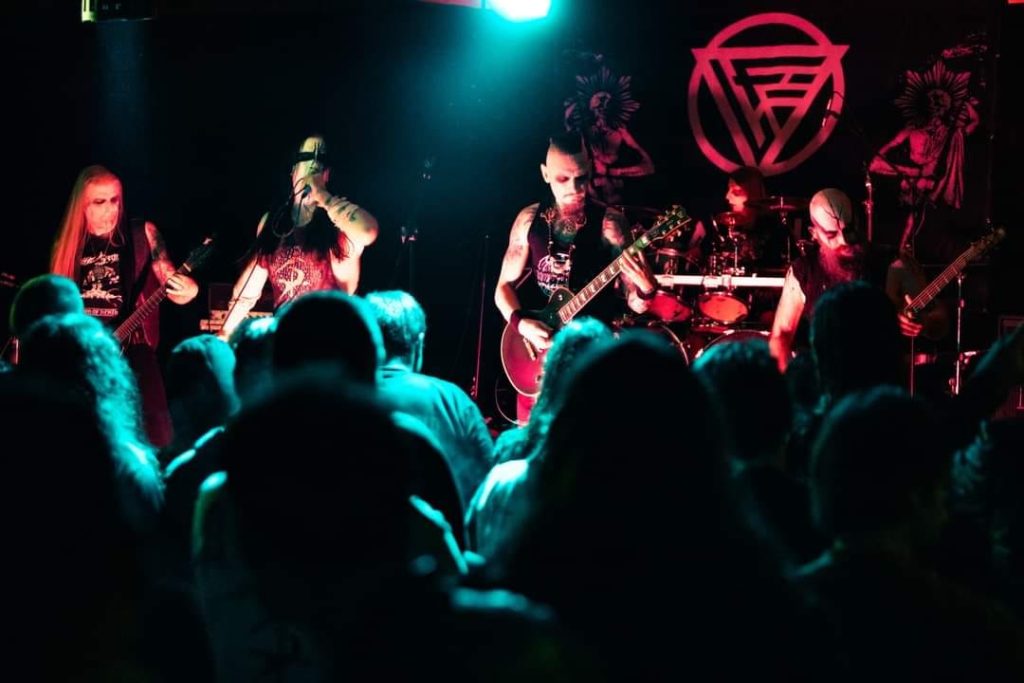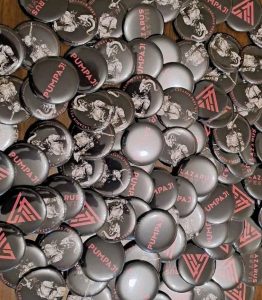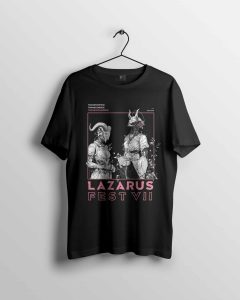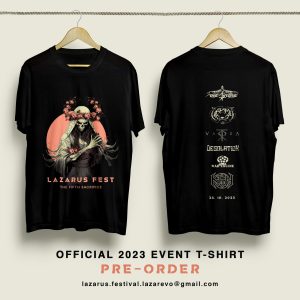Once a year, a small village in Middle Banat becomes the center of dirty and technically polished, but fierce sound, blast beat and uncontrolled positive energy — the kind that typically reigns amongst people who belong to metal subcultures. The place is Lazarevo, and the festival named Lazarus is steadily stepping forward as an event worth visiting, especially if you consider yourself part of those subcultures, or if you’re very curious about the musical offerings of Vojvodina (because why not).
The sixth edition of the festival will take place on October 26, 2024, and on that occasion we decided to ask them about health and necks after relentless, increasingly intense headbanging.
Helly Cherry (HC): Greetings to our dear people and hard alterna folks of all factions in Lazarevo!
Lazarus Fest (LF): Greetings to you, northerner, our Black Slavic brother, who comes to visit us every year around this time, via bad Vojvodina rails and bumpy roads, bringing us gifts and sacrifices (laughs).
HC: We’ve arrived at the sixth edition of the festival, with a slow (Vojvodina‐style) step. What are your expectations for this year’s edition? Briefly present the program and what the audience can expect.
LF: This year we made a serious restart, especially in technical-logistical terms. For the first time we’ve engaged Dark Studio (Cefa and team) to do sound and lighting, so we expect this will be the best Lazarus yet in those aspects. Also, we expect the program this year to be interesting enough for the audience to drag themselves out to Lazarevo in as large numbers as possible, and that attendance will be at least at the level of the previous edition. We’ve strived to make the offering truly varied so everyone can find their cup of tea within the subgenres of metal and hardcore.
The festival will be opened by our old friends from the pre-Lazarus period, the Novi Sad stoner/psychedelic/desert/doom band Cheap Moonshine, guys who played at what we call the “zero Lazarus” event. Then comes the death metal band Mogila Deathcult from Požarevac (ex-Grobdanište). Zrenjanin will be represented once again by Forgotten Scream, for the third time, but now in a completely new form, fresher and more modern than ever.
What may have been missing from Lazarus so far is a bit of classic and traditional heavy metal sound, spiced with power and epic elements, and to that end the Kragujevac band Oathbringer will play. At the end of the official program, the audience will be treated to the darkest that rock’n’roll has to offer – Belgrade black metal acts Svartgren and The Bloody Earth, and the legendary death doom / funeral doom act from Niš in their new iteration.
In the unofficial part of the program, after the official program ends, a non-ordinary synthwave duo from southern Banat will perform as secret guests — already breaking borders in Serbia with their original expression; that’s all we’ll reveal for now. Aside from performers, there will of course be stalls. This year, for the first time, our guest is Dragana Starovlah, a girl who’ll be doing tattoos on the spot, so people will be able to take home a cool memory from the festival in the form of some neat tattoo at a special promotion price.
The horror fanzine Crnoslovlje will also have its stand this year, as will all the bands performing at the festival, and finally us, with our festival shirts. So, the audience will have the opportunity to open their hearts and wallets, and to support the underground! There’s still time to apply for your stand, get in touch! Festival goers themselves are also invited to come masked! Last year, at our invitation, a good percentage of people came in masks and costumes, and this year we want that to grow even more, to become a tradition, that Lazarus Fest in perspective becomes a big masked ball — because creativity and freedom within it are the main messages we as a festival send out, all this happening just ahead of Halloween.
The most creative mask again this year will receive a prize!
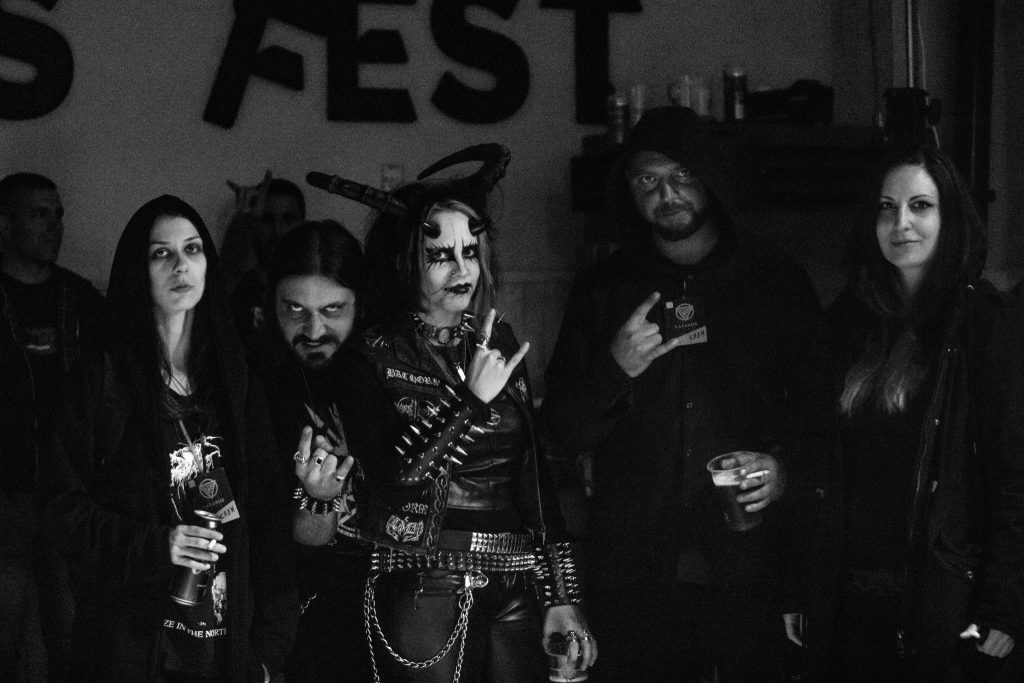
HC: In your first interview you touched on the accompanying program of the festival and the possibility of exhibitions and similar events — has anything changed in that regard, and are any such things already being realized as part of the festival itself?
LF: In that way there has been progress, and this year we will have an interesting art installation prepared by Zrenjanin artists Smiljana Mirkov and Sofija Lalović, inspired by our festival. They are making some kind of horror dolls which will hang around and create a creepy ambience in the Cultural Center where the fest is held. I don’t know to what extent they’ll manage to finish everything they planned, but the idea is that this installation will grow year to year, that those dolls will multiply and become even creepier (laughs).
In any case, such initiatives are more than welcome, so we invite other artists to get in touch, because throughout the Cultural Center compound in Lazarevo there is enough space for exhibitions, panels, screenings, and many other things.
Don’t wait for us to pull you by the sleeve, and be sure that we will do the same! (laughs)
HC: How does the newly acquired nickname of Lazarevo as the “metal village,” which has appeared in independent media, sound to you? How open can a somewhat traditional village be to unusual artistic expressions, and does this apply to Lazarevo after all these years?
LF: A living person gets used to all kinds of things, and our villagers too (laughs)! The media only borrowed a nickname that we gave ourselves in the text announcing the event, because we really like being perceived that way (laughs).
I must admit that we have never had troubles with the residents of our village since we have been organizing the festival, and now I can firmly state that they have accepted us — and that is all we expect — a peaceful coexistence (laughs). People here mostly fall into those who openly praise and support us (a thin minority), and those for whom everything we do is totally alien and viewed with a dose of distrust, but still somewhere they have a sense that something potentially important is happening for the village.
Earlier, when we were adolescents and metalheads from head to toe, we had more problems than today in the mature years when we began organizing the festival; to that in the past contributed a deeply unprofessional and tabloid-style article in the newspaper Zrenjanin in which my friends from Lazarevo and I were connected with all kinds of satanic sects and so on, which then led to harassment and bullying, to which some unprofessional educators in the primary school also contributed, warning children not to stay out late at night because of satanists who roam the village, desecrate the local cemetery, slaughter chickens or orgie in blood (laughs).
However, all that is a distant past now; the physical wounds have healed, perhaps from psychological ones we are still somewhat antisocial, but functional in society. Today we even regularly attend football matches of the local football club “Zadrugar” from Lazarevo, we financially support the club and sit in the part of the stands where the most passionate supporters are, a fan group called “Skandal,” in which there prevails a far-right ideological discourse or at best conservative; and they sometimes come to our festival to support and always offer their help in the organization.
That happens when people are offered a brotherly hand and understanding, and when bridges are built between people, instead of deepening division and hatred in an already deeply divided society. We don’t need to believe in the same things in order to bring about positive change in our small community. That is another message we want to send out.
HC: Lazarus is first of all oriented toward traditional and modern sounds in the metal domain, but also hardcore genres — of course, with certain exceptions, such as Vartra last year.
Besides people who follow that sound, do you notice growing interest from people around who maybe didn’t follow the whole story earlier, or does it all remain the impression of a ‘one-off’ musical miracle? Are there new kids, because it’s increasingly obvious there’s a gap in generations who are now in their twenties, in all fields?
LF: There have been exceptions in the past, e.g. Empathy Soul Project or Brigand, though the latter had strong metal influences too. The point is that from the start, it was never our idea to limit ourselves only to metal, but to make Lazarus an alternative and underground festival in the broadest sense. However, when you have limited resources and must cram everything into a one-day format on one stage, genre mixing is not always the best idea. That would be feasible if we managed to expand the festival into a multi-day format, with multiple stages, but for now it remains just imagination.
Still, we really like to imagine, because if we didn’t, we wouldn’t have come this far; so in the future, who knows. For now we are committed to metal because that’s the sound we grew up on and the sound that shaped us both as personalities and as lovers of music and art in the broadest sense. With this festival we are repaying that debt to the kids inside us, while also trying to reach new young people you are talking about. How successful we are in that, I truly can’t estimate.
It is evident that we exert some influence, and there is a group of kids, specifically from Lazarevo, who always show up whenever we come a day before the festival to the Cultural Center to set up the space, they stay with us the whole time, even the day after, when we clean and return the space to its original state. We treat them a little, give them a flyer, poster, festival shirt, and they are overjoyed. Moreover, all of this is new and interesting to them, and I see that some of them have already started going to shows beyond Lazarevo, wearing combat boots and such, and that gives us real satisfaction and encouragement that we are not doing all this in vain; how far the real reach of that influence is, time will tell.
HC: Can you tell us whether anything has changed in your approach to organizing the festival over past years? Actually, how hard (or easy) is it to organize an independent festival? Do you have support on the local level or do you mostly rely on a DIY approach?
LF: This year for the first time completely DIY. Except for free transport provided by the Tourism Organization of the city of Zrenjanin for festival visitors from Zrenjanin to Lazarevo, everything else is DIY.
In earlier years we got quite paltry funding from the local self-government of the city of Zrenjanin and the local office of Lazarevo, so even then it was mostly DIY. However, we really don’t suffer from whether someone categorizes us a DIY festival or not.
I wish representatives of government administration would recognize such and similar projects of citizen associations; but they wouldn’t recognize them even if their eyes were gouged out, rather they are exclusively thinking about how to distribute funds so that none of their party friends are offended, and how to launder as much money as possible through fictitious projects of fictitious associations. Leaving aside that what we do is completely foreign to them in a cultural sense, so their real support would be insincere.
And after they presumably realized that we will never agree to any trades with them and that we will not collect votes for them, because we would thereby spit on everything we believe in, then they turned off even the small funds they were giving us up to now, despite that our idea clearly showed its potency, which anyone who bothered to peek into the Cultural Center last year could see.
In circumstances where the state is alienated from its citizens, and EU funds are far away, the situation is very difficult and the entire scene suffers from chronic lack of money. However, paradoxically, that is also a relief, because where there is no money there is solidarity, so performers are very ready to come to us just for travel expenses or for some minimal fees if they are more established or have a larger cult following.
We often get from various sides that what we are doing is out of line, especially that this is being done in a village — to which we reply that those people are not normal who do not do the same in their own village, town, wherever literally. Almost every place has some cultural center or youth center as a remainder from when the state had a more serious cultural and youth policy than it does now. Register an association with three signatures. Rent some sound system to begin with, because you have to start somewhere; invite bands, people will come to support the idea. Make a festival in your village, and then we’ll compete whose festival is better, instead of wasting energy on empty defeatism and disparaging someone else’s effort. That’s how the scene is built, and we deeply believe that decentralization of it is the key.
As for our approach to organization, what has changed is that we are now old enough and well enough acquainted with the situation on the scene to more carefully choose who we collaborate with, and better distinguish who is truly sincere, and who is, commonly speaking, someone looking only for their own petty interest. In the future we will try to surround ourselves with the right people who really value and sincerely support what we do.
HC: Can festivals have role models? I mentioned Wacken as an example in the title (although I seriously mean it), but in terms of DIY, are there other festivals with which you can identify Lazarus?
LF: If we talk about metal festivals that are an unreachable ideal in our conditions, my personal favorite is the French Hellfest, and it also happens in Clisson, a small town with about 7,000 inhabitants. From more sub-genre oriented ones, there is the Dutch Roadburn.
However, we are above all inspired by people who, in these local conditions, try to make something out of nothing, whether DIY or semi-DIY, it doesn’t matter. I’ll just mention a few: Festival of Serbian Underground (including everything else that Milan Rakić and his team organize), Mount of Artan (Goran Lončarević and team), Slaughter Fest in Doljevac, Belgrade Metal Fest, Decaying With the Boys (team from Violent Chapter), Empire Metal Fest (team from Kobold), Zlo Fest in Novi Sad (team from War Engine), Ljubav i bes (Cef and his team), Feelgood (Nikola Lukić and his people from Sombor), Ekoslavija (Subotica), Breakdown Galore (the team from Forgotten Scream)…
Don’t blame me if I haven’t mentioned someone because maybe we haven’t checked that fest yet. These are all people we admire and who inspire us, and I hope we inspire them too (laughs).
HC: What, in your opinion, is the future of small festivals that are outside the mainstream currents — do you have expectations or wishes for Lazarus in the near future?
LF: I believe in their survival and development because they arose out of people’s deep need to create their own corner in which they’ll feel good; and when such escapism becomes an imperative in itself, then there is no stronger driving force. Because the more abnormal the circumstances, the stronger the need for these oases of normality and healthy social fabric, which, even if they never prevail, must exist, because if they do not exist, everything is lost. I would like Lazarus to in the near future become a two-day festival and to book at least two (one each day) respectable representatives of the world underground metal scene, with whom our bands will share the stage in Lazarevo.
HC: If we missed asking something, feel free to add, comment.
LF: I just want to take the opportunity to thank the people without whose donations this edition of the festival would not be possible, first and foremost members of our association Radovan Milović, Nebojša Grujić and Dejan Milovuković, and immediately after that Radomir Bogdanović, our neighbor from nearby Žitište. And if you add Katarina Mirčov to that, you get the hard core of Lazarus Fest.
But Lazarus Fest is also all of you who attend our festival, all the bands who have ever performed on our stage, all of you who buy our shirts or in any way support our idea. We’ve arranged for you again this year free entry and free transport from Zrenjanin to Lazarevo and back, despite all the financial problems we have faced.
You should know that this edition was hanging by a thread and we pulled the best we could out of the situation we found ourselves in, with the selfless support of the performers and great understanding from the Dark Studio team. At the entrance there will be a donation box, so you’ll have the chance to give back a little love.
See you on October 26 in Lazarevo!
Interview with Aleksandar Petrović conducted by Daniel Tikvicki
Source: Helly Cherry

